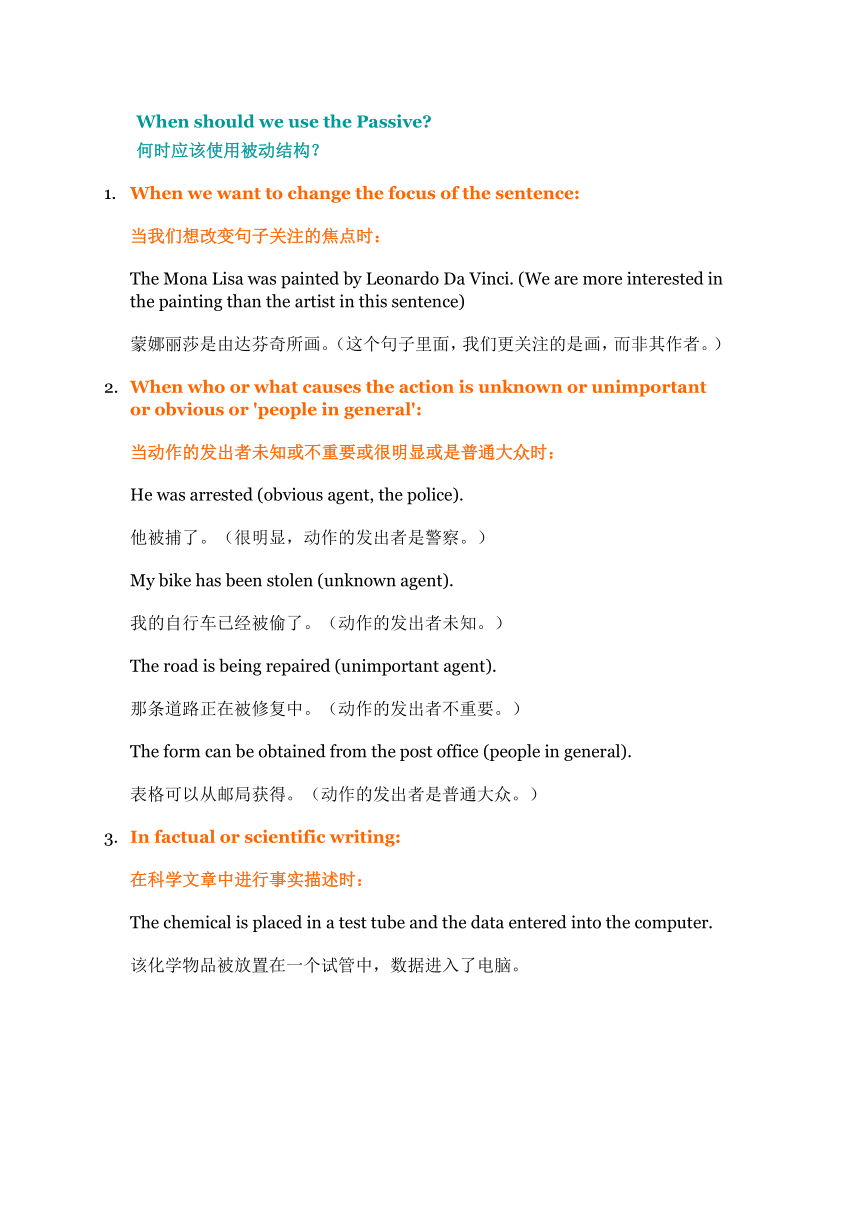高考英语专项 语法 时态 23 被动句之何时应该用被动
文档属性
| 名称 | 高考英语专项 语法 时态 23 被动句之何时应该用被动 |

|
|
| 格式 | |||
| 文件大小 | 140.1KB | ||
| 资源类型 | 试卷 | ||
| 版本资源 | 通用版 | ||
| 科目 | 英语 | ||
| 更新时间 | 2024-03-06 00:00:00 | ||
图片预览

文档简介
When should we use the Passive
何时应该使用被动结构?
1. When we want to change the focus of the sentence:
当我们想改变句子关注的焦点时:
The Mona Lisa was painted by Leonardo Da Vinci. (We are more interested in
the painting than the artist in this sentence)
蒙娜丽莎是由达芬奇所画。(这个句子里面,我们更关注的是画,而非其作者。)
2. When who or what causes the action is unknown or unimportant
or obvious or 'people in general':
当动作的发出者未知或不重要或很明显或是普通大众时:
He was arrested (obvious agent, the police).
他被捕了。(很明显,动作的发出者是警察。)
My bike has been stolen (unknown agent).
我的自行车已经被偷了。(动作的发出者未知。)
The road is being repaired (unimportant agent).
那条道路正在被修复中。(动作的发出者不重要。)
The form can be obtained from the post office (people in general).
表格可以从邮局获得。(动作的发出者是普通大众。)
3. In factual or scientific writing:
在科学文章中进行事实描述时:
The chemical is placed in a test tube and the data entered into the computer.
该化学物品被放置在一个试管中,数据进入了电脑。
4. In formal writing instead of using someone/ people/ they (these
can be used in speaking or informal writing):
在正式写作中避免使用 someone/people/they 这些词:
The brochure will be finished next month.
宣传单将在下个月(被)完成。
5. In order to put the new information at the end of the sentence to
improve style:
为了在句尾加入新信息,从而改善写作风格:
Three books are used regularly in the class. The books were written by Dr. Bell.
('Dr. Bell wrote the books' sound clumsy)
有三本书是在课上经常使用的。这些书是由贝尔博士所著。(如果写成“贝尔博
士写了这些书”就有点唐突了。因为上一句一直讲的书,把主题一下换成贝尔博
士有些突兀。)
6. When the subject is very long:
当句子的主语很长的时候:
I was surprised by how well the students did in the test. (More natural than:
'how well the students did in the test surprised me')
这些学生考得如此之好,让我实在吃惊。
何时应该使用被动结构?
1. When we want to change the focus of the sentence:
当我们想改变句子关注的焦点时:
The Mona Lisa was painted by Leonardo Da Vinci. (We are more interested in
the painting than the artist in this sentence)
蒙娜丽莎是由达芬奇所画。(这个句子里面,我们更关注的是画,而非其作者。)
2. When who or what causes the action is unknown or unimportant
or obvious or 'people in general':
当动作的发出者未知或不重要或很明显或是普通大众时:
He was arrested (obvious agent, the police).
他被捕了。(很明显,动作的发出者是警察。)
My bike has been stolen (unknown agent).
我的自行车已经被偷了。(动作的发出者未知。)
The road is being repaired (unimportant agent).
那条道路正在被修复中。(动作的发出者不重要。)
The form can be obtained from the post office (people in general).
表格可以从邮局获得。(动作的发出者是普通大众。)
3. In factual or scientific writing:
在科学文章中进行事实描述时:
The chemical is placed in a test tube and the data entered into the computer.
该化学物品被放置在一个试管中,数据进入了电脑。
4. In formal writing instead of using someone/ people/ they (these
can be used in speaking or informal writing):
在正式写作中避免使用 someone/people/they 这些词:
The brochure will be finished next month.
宣传单将在下个月(被)完成。
5. In order to put the new information at the end of the sentence to
improve style:
为了在句尾加入新信息,从而改善写作风格:
Three books are used regularly in the class. The books were written by Dr. Bell.
('Dr. Bell wrote the books' sound clumsy)
有三本书是在课上经常使用的。这些书是由贝尔博士所著。(如果写成“贝尔博
士写了这些书”就有点唐突了。因为上一句一直讲的书,把主题一下换成贝尔博
士有些突兀。)
6. When the subject is very long:
当句子的主语很长的时候:
I was surprised by how well the students did in the test. (More natural than:
'how well the students did in the test surprised me')
这些学生考得如此之好,让我实在吃惊。
同课章节目录
- 名词
- 动词/动词短语
- 一般现在时及其被动式
- 一般过去时及其被动式
- 现在进行时及其被动式
- 过去进行时及其被动式
- 将来进行时及其被动式
- 现在完成时及其被动式
- 过去完成时及其被动式
- 一般将来时及其被动式
- 过去将来时及其被动式
- 现在完成进行时及其被动式
- 将来完成时及其被动式
- 副词
- 介词/介词短语
- 连词/连接词
- 数词/量词
- 冠词
- 形容词
- 非谓语动词
- 句型
- 简单句与并列句
- 复合句
- 主谓一致
- 倒装与省略
- 强调句
- 虚拟语气
- 插入语
- 固定句型
- 祈使句/感叹句
- 疑问句/反义疑问句
- 非限制性定语从句
- 句型转换
- 定语从句
- 表语从句
- 宾语从句
- 主语从句
- 动词时态与语态
- 虚拟语气与情态动词
- 主谓一致
- 独立主格结构、with的复合结构
- 情态动词
- 状语从句
- 定语从句
- 特殊句式
- 交际用语
- 代词/不定代词
- 名词性从句
- 同位语从句
- 表语从句
- 宾语从句
- 主语从句
- 直接引语和间接引语
- 构词法(word formation)
